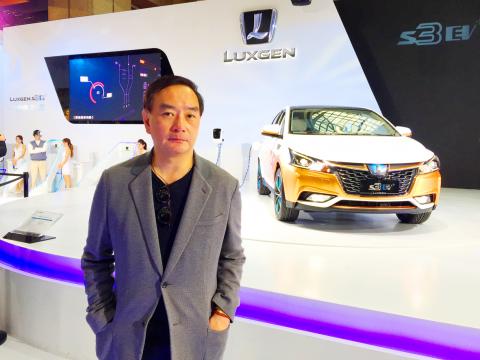Yulon Group (裕隆集團) chief executive officer Kenneth Yen (嚴凱泰) died yesterday at the age of 54, Yulon Motor Co (裕隆汽車) announced in a statement.
Yen’s wife, Lilian Chen (嚴陳莉蓮), is to take over for her husband, and corporate operations would not be affected by Yen’s death, the statement said.
The statement did not specify the cause of Yen’s death, but Chinese-language media reports, citing unnamed sources at Taipei Veterans General Hospital, said Yen had been treated at the hospital for some time for esophageal cancer.

Photo: Yang Ya-min, Taipei Times
The news caught many off guard, although media reports said Yen’s absence from an investors’ conference in June had aroused speculations about his health.
Yulon Group at the time said he had taken a day off due to a leg injury.
Yen was the only child of Yen Ching-ling (嚴慶齡), the founder of Yulon Group, and “Iron Lady” Vivian Shun-wen Wu (吳舜文), the group’s former chairwoman.
He studied at Rice University in Houston, Texas, and after returning home in 1989, he joined the automaker as a vice president.
He was appointed the group’s chief executive officer in 1990.
After Yulon Motor reported losses for the third consecutive year in 1995, Yen decided to restructure the automaker by moving its Taipei office and plant in what was then Sindian, Taipei County, to a site in Miaoli County’s Sanyi Township (三義) to lower overheads and to integrate the office and factory.
Under his leadership, Yulon Motor introduced the Cefiro passenger car in 1995, which became the best-selling vehicle in the nation and helped turn around the company.
Yen took over as chairman of Yulon Motor in 2007 from his mother and expanded the group’s business scope to industries including textiles, electronics and construction.

DAREDEVIL: Honnold said it had always been a dream of his to climb Taipei 101, while a Netflix producer said the skyscraper was ‘a real icon of this country’ US climber Alex Honnold yesterday took on Taiwan’s tallest building, becoming the first person to scale Taipei 101 without a rope, harness or safety net. Hundreds of spectators gathered at the base of the 101-story skyscraper to watch Honnold, 40, embark on his daredevil feat, which was also broadcast live on Netflix. Dressed in a red T-shirt and yellow custom-made climbing shoes, Honnold swiftly moved up the southeast face of the glass and steel building. At one point, he stepped onto a platform midway up to wave down at fans and onlookers who were taking photos. People watching from inside

A Vietnamese migrant worker yesterday won NT$12 million (US$379,627) on a Lunar New Year scratch card in Kaohsiung as part of Taiwan Lottery Co’s (台灣彩券) “NT$12 Million Grand Fortune” (1200萬大吉利) game. The man was the first top-prize winner of the new game launched on Jan. 6 to mark the Lunar New Year. Three Vietnamese migrant workers visited a Taiwan Lottery shop on Xinyue Street in Kaohsiung’s Gangshan District (崗山), a store representative said. The player bought multiple tickets and, after winning nothing, held the final lottery ticket in one hand and rubbed the store’s statue of the Maitreya Buddha’s belly with the other,

Japan’s strategic alliance with the US would collapse if Tokyo were to turn away from a conflict in Taiwan, Japanese Prime Minister Sanae Takaichi said yesterday, but distanced herself from previous comments that suggested a possible military response in such an event. Takaichi expressed her latest views on a nationally broadcast TV program late on Monday, where an opposition party leader criticized her for igniting tensions with China with the earlier remarks. Ties between Japan and China have sunk to the worst level in years after Takaichi said in November that a hypothetical Chinese attack on Taiwan could bring about a Japanese

‘COMMITTED TO DETERRENCE’: Washington would stand by its allies, but it can only help as much as countries help themselves, Raymond Greene said The US is committed to deterrence in the first island chain, but it should not bear the burden alone, as “freedom is not free,” American Institute in Taiwan Director Raymond Greene said in a speech at the Institute for National Defense and Security Research’s “Strengthening Resilience: Defense as the Engine of Development” seminar in Taipei yesterday. In the speech, titled “Investing Together and a Secure and Prosperous Future,” Greene highlighted the contributions of US President Donald Trump’s administration to Taiwan’s defense efforts, including the establishment of supply chains for drones and autonomous systems, offers of security assistance and the expansion of